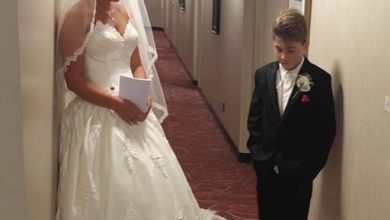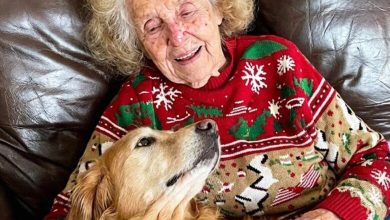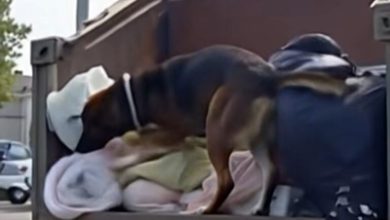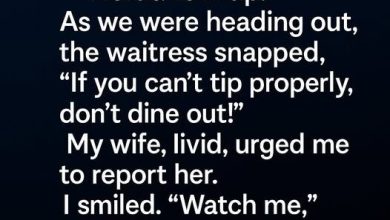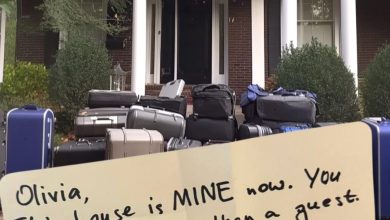
I Gave Food to a Hungry Veteran and His Dog – a Month Later, My Boss Dragged Me into His Office, Furious, and My Whole Life Flipped Upside Down
I was dragging myself through another exhausting day at the insurance office — the kind of cramped little place where fluorescent lights buzz louder than the employees and where people only remember you when something goes wrong. I was behind on everything, running late picking up groceries, already picturing my kids bouncing off the walls at home while my mom tried to keep up.
My mom had stepped in again that evening because our nanny couldn’t make it. She’d already pulled a long shift at the hospital, and I heard the fatigue in her voice when she called earlier asking if screen time was okay for the kids. Of course it was. She’s held my life together ever since my ex-husband walked out two years ago declaring he “wasn’t built for family life.” He left, and she filled his place without blinking.
By the time I hit the grocery store, the sky was dark and winter-cold. I grabbed the essentials — mac ’n’ cheese, chicken tenders, apples, juice boxes — the standard single-mom survival rations. My arms were loaded with bags when I stepped into the biting wind outside.
That’s when I saw him.
A man in his late forties sat on the curb near the cart corral, hunched into himself like he was trying to disappear. Curled against him was a German Shepherd, watchful and calm. The dog looked cared for. The man didn’t. His coat was too thin, and his face carried the hollow strain of someone trying to keep going on fumes.
He cleared his throat when he noticed me looking. “Ma’am… I’m sorry to bother you. I’m a veteran. We haven’t eaten since yesterday. I’m not asking for money, just… if you have anything extra.”
Every instinct in me said keep walking. Alone in a dark parking lot, weighted down with groceries, is not the setup for wise decisions. But there was something in the way he rested his hand on the dog, like that creature was the last steady thing in his world.
Before I could overthink it, I told him, “Hold on,” turned back into the store, and went straight to the deli. I bought a hot dinner — real food, the comforting kind — plus a big bag of dog kibble and water. When I brought it out, his eyes went soft and wet, like he couldn’t believe the bags were meant for him.
“You have no idea what this means,” he whispered.
“It’s nothing,” I said. “Just take care of your friend.”
He thanked me again and again, the dog thumped its tail, and I drove home thinking it was just another anonymous moment of kindness in a long, exhausting life.
A month passed. I barely remembered that night between juggling appointments, emails, and the endless treadmill of housework. Then one afternoon, while I was wrestling with a stubborn policy renewal on my computer, my boss — Mr. Henderson, a man who always seemed moments away from declaring war on the copier — walked out of his office looking paler and angrier than usual.
“Come here, Michelle,” he snapped.
Something in his tone sank straight into my gut. I followed him into his office, and he pushed a cream-colored envelope across his desk toward me like it was contraband.
“You need to read this.”
Inside was a formal commendation from a veterans’ organization. It praised me for helping a veteran in need and suggested my company promote me or at least give recognition for “exceptional integrity.”
I was stunned. I hadn’t told a single soul what I’d done. “I just bought them dinner,” I said. “That’s all.”
His face twisted like he smelled something rotten. “Don’t play innocent. This is a stunt. You set this up to force my hand.”
I blinked. “What? I didn’t—”
He cut me off. “I will not let outside groups dictate my decisions. I know manipulation when I see it. You’re fired. Immediately.”
My whole body went cold. “Mr. Henderson, please — I have two kids. I need this job. I swear I didn’t—”
But he was already pointing at the door. I packed my things with shaking hands and left feeling like the ground had been yanked out from under me.
That night, after the kids went to bed, I opened the letter again and read it slowly, really absorbing the words. The organization was legitimate. I searched them online. Real people, real work, real recognition.
The next morning, I called the number on the letter. A woman named Stephanie answered, and her tone changed the second I said my name.
“Oh my God,” she breathed. “Are you okay?”
I told her everything — the man, the dog, the groceries, the letter, the way my boss exploded like I’d orchestrated a corporate coup. When I finished, she said, “Can you come into our office tomorrow? We want to speak with you in person.”
Their building the next day was bright and warm, decorated with photos of veterans they’d helped. They treated me like someone important, not like a replaceable office widget.
In a conference room, they told me the whole story.
A few days after I fed him, the veteran walked into their office for help. He told them he’d hit a point where he genuinely felt invisible — like people saw through him. The hot meal, he said, made him feel human again. It reminded him that he still mattered. That one small act pushed him to seek help.
They got him medical care, clothing, temporary housing, and eventually job placement. He was stable now, safe. And he wanted to thank me properly. He’d remembered my name from my work badge and asked them to send a letter of commendation to my employer.
When they learned my boss had fired me over it, they were furious.
And they had lawyers.
They offered to take my case for free.
Two months later, after legal back-and-forth that felt like a second job, I was vindicated. Mr. Henderson was removed for wrongful termination. I received compensation for lost wages and emotional distress.
But the best part came next.
The veterans’ organization offered me a job.
The director told me, “We need people who don’t look away. People like you.”
It wasn’t just a better salary — though it absolutely was. It wasn’t just the benefits. It was the meaning. For the first time in years, I’d be doing work that mattered, work that helped people rebuild their lives.
I accepted.
Now I talk to veterans every day — people fighting quiet battles — and I help them get the support they deserve. My days aren’t something I try to escape anymore.
A hot meal in a cold parking lot changed two lives that night. His. And mine.
And it reminded me of something simple and powerful: kindness doesn’t disappear. It circles back. Every time.
